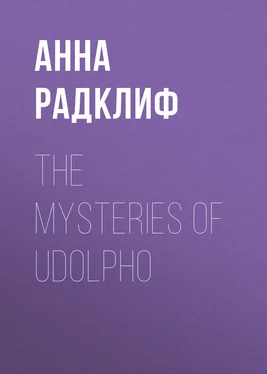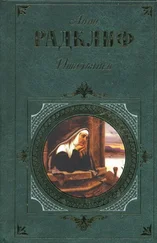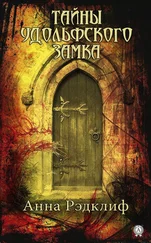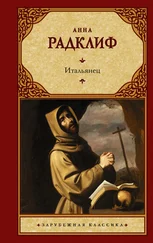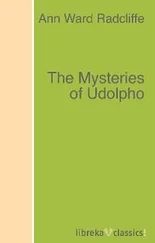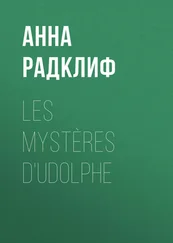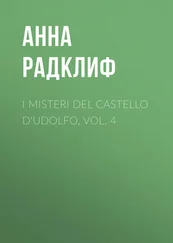Анна Радклиф - The Mysteries of Udolpho
Здесь есть возможность читать онлайн «Анна Радклиф - The Mysteries of Udolpho» — ознакомительный отрывок электронной книги совершенно бесплатно, а после прочтения отрывка купить полную версию. В некоторых случаях можно слушать аудио, скачать через торрент в формате fb2 и присутствует краткое содержание. Жанр: foreign_prose, literature_19, Ужасы и Мистика, foreign_fantasy, foreign_antique, на английском языке. Описание произведения, (предисловие) а так же отзывы посетителей доступны на портале библиотеки ЛибКат.
- Название:The Mysteries of Udolpho
- Автор:
- Жанр:
- Год:неизвестен
- ISBN:нет данных
- Рейтинг книги:5 / 5. Голосов: 1
-
Избранное:Добавить в избранное
- Отзывы:
-
Ваша оценка:
- 100
- 1
- 2
- 3
- 4
- 5
The Mysteries of Udolpho: краткое содержание, описание и аннотация
Предлагаем к чтению аннотацию, описание, краткое содержание или предисловие (зависит от того, что написал сам автор книги «The Mysteries of Udolpho»). Если вы не нашли необходимую информацию о книге — напишите в комментариях, мы постараемся отыскать её.
The Mysteries of Udolpho — читать онлайн ознакомительный отрывок
Ниже представлен текст книги, разбитый по страницам. Система сохранения места последней прочитанной страницы, позволяет с удобством читать онлайн бесплатно книгу «The Mysteries of Udolpho», без необходимости каждый раз заново искать на чём Вы остановились. Поставьте закладку, и сможете в любой момент перейти на страницу, на которой закончили чтение.
Интервал:
Закладка:
They returned pensively to the chateau, Emily musing on the incident which had just occurred; St. Aubert reflecting, with placid gratitude, on the blessings he possessed; and Madame St. Aubert somewhat disturbed, and perplexed, by the loss of her daughter's picture. As they drew near the house, they observed an unusual bustle about it; the sound of voices was distinctly heard, servants and horses were seen passing between the trees, and, at length, the wheels of a carriage rolled along. Having come within view of the front of the chateau, a landau, with smoking horses, appeared on the little lawn before it. St. Aubert perceived the liveries of his brother-in-law, and in the parlour he found Monsieur and Madame Quesnel already entered. They had left Paris some days before, and were on the way to their estate, only ten leagues distant from La Vallee, and which Monsieur Quesnel had purchased several years before of St. Aubert. This gentleman was the only brother of Madame St. Aubert; but the ties of relationship having never been strengthened by congeniality of character, the intercourse between them had not been frequent. M. Quesnel had lived altogether in the world; his aim had been consequence; splendour was the object of his taste; and his address and knowledge of character had carried him forward to the attainment of almost all that he had courted. By a man of such a disposition, it is not surprising that the virtues of St. Aubert should be overlooked; or that his pure taste, simplicity, and moderated wishes, were considered as marks of a weak intellect, and of confined views. The marriage of his sister with St. Aubert had been mortifying to his ambition, for he had designed that the matrimonial connection she formed should assist him to attain the consequence which he so much desired; and some offers were made her by persons whose rank and fortune flattered his warmest hope. But his sister, who was then addressed also by St. Aubert, perceived, or thought she perceived, that happiness and splendour were not the same, and she did not hesitate to forego the last for the attainment of the former. Whether Monsieur Quesnel thought them the same, or not, he would readily have sacrificed his sister's peace to the gratification of his own ambition; and, on her marriage with St. Aubert, expressed in private his contempt of her spiritless conduct, and of the connection which it permitted. Madame St. Aubert, though she concealed this insult from her husband, felt, perhaps, for the first time, resentment lighted in her heart; and, though a regard for her own dignity, united with considerations of prudence, restrained her expression of this resentment, there was ever after a mild reserve in her manner towards M. Quesnel, which he both understood and felt.
In his own marriage he did not follow his sister's example. His lady was an Italian, and an heiress by birth; and, by nature and education, was a vain and frivolous woman.
They now determined to pass the night with St. Aubert; and as the chateau was not large enough to accommodate their servants, the latter were dismissed to the neighbouring village. When the first compliments were over, and the arrangements for the night made M. Quesnel began the display of his intelligence and his connections; while St. Aubert, who had been long enough in retirement to find these topics recommended by their novelty, listened, with a degree of patience and attention, which his guest mistook for the humility of wonder. The latter, indeed, described the few festivities which the turbulence of that period permitted to the court of Henry the Third, with a minuteness, that somewhat recompensed for his ostentation; but, when he came to speak of the character of the Duke de Joyeuse, of a secret treaty, which he knew to be negotiating with the Porte, and of the light in which Henry of Navarre was received, M. St. Aubert recollected enough of his former experience to be assured, that his guest could be only of an inferior class of politicians; and that, from the importance of the subjects upon which he committed himself, he could not be of the rank to which he pretended to belong. The opinions delivered by M. Quesnel, were such as St. Aubert forebore to reply to, for he knew that his guest had neither humanity to feel, nor discernment to perceive, what is just.
Madame Quesnel, meanwhile, was expressing to Madame St. Aubert her astonishment, that she could bear to pass her life in this remote corner of the world, as she called it, and describing, from a wish, probably, of exciting envy, the splendour of the balls, banquets, and processions which had just been given by the court, in honour of the nuptials of the Duke de Joyeuse with Margaretta of Lorrain, the sister of the Queen. She described with equal minuteness the magnificence she had seen, and that from which she had been excluded; while Emily's vivid fancy, as she listened with the ardent curiosity of youth, heightened the scenes she heard of; and Madame St. Aubert, looking on her family, felt, as a tear stole to her eye, that though splendour may grace happiness, virtue only can bestow it.
'It is now twelve years, St. Aubert,' said M. Quesnel, 'since I purchased your family estate.'—'Somewhere thereabout,' replied St. Aubert, suppressing a sigh. 'It is near five years since I have been there,' resumed Quesnel; 'for Paris and its neighbourhood is the only place in the world to live in, and I am so immersed in politics, and have so many affairs of moment on my hands, that I find it difficult to steal away even for a month or two.' St. Aubert remaining silent, M. Quesnel proceeded: 'I have sometimes wondered how you, who have lived in the capital, and have been accustomed to company, can exist elsewhere;—especially in so remote a country as this, where you can neither hear nor see any thing, and can in short be scarcely conscious of life.'
'I live for my family and myself,' said St. Aubert; 'I am now contented to know only happiness;—formerly I knew life.'
'I mean to expend thirty or forty thousand livres on improvements,' said M. Quesnel, without seeming to notice the words of St. Aubert; 'for I design, next summer, to bring here my friends, the Duke de Durefort and the Marquis Ramont, to pass a month or two with me.' To St. Aubert's enquiry, as to these intended improvements, he replied, that he should take down the whole east wing of the chateau, and raise upon the site a set of stables. 'Then I shall build,' said he, 'a SALLE A MANGER, a SALON, a SALLE AU COMMUNE, and a number of rooms for servants; for at present there is not accommodation for a third part of my own people.'
'It accommodated our father's household,' said St. Aubert, grieved that the old mansion was to be thus improved, 'and that was not a small one.'
'Our notions are somewhat enlarged since those days,' said M. Quesnel;—'what was then thought a decent style of living would not now be endured.' Even the calm St. Aubert blushed at these words, but his anger soon yielded to contempt. 'The ground about the chateau is encumbered with trees; I mean to cut some of them down.'
'Cut down the trees too!' said St. Aubert.
'Certainly. Why should I not? they interrupt my prospects. There is a chesnut which spreads its branches before the whole south side of the chateau, and which is so ancient that they tell me the hollow of its trunk will hold a dozen men. Your enthusiasm will scarcely contend that there can be either use, or beauty, in such a sapless old tree as this.'
'Good God!' exclaimed St. Aubert, 'you surely will not destroy that noble chesnut, which has flourished for centuries, the glory of the estate! It was in its maturity when the present mansion was built. How often, in my youth, have I climbed among its broad branches, and sat embowered amidst a world of leaves, while the heavy shower has pattered above, and not a rain drop reached me! How often I have sat with a book in my hand, sometimes reading, and sometimes looking out between the branches upon the wide landscape, and the setting sun, till twilight came, and brought the birds home to their little nests among the leaves! How often—but pardon me,' added St. Aubert, recollecting that he was speaking to a man who could neither comprehend, nor allow his feelings, 'I am talking of times and feelings as old-fashioned as the taste that would spare that venerable tree.'
Читать дальшеИнтервал:
Закладка:
Похожие книги на «The Mysteries of Udolpho»
Представляем Вашему вниманию похожие книги на «The Mysteries of Udolpho» списком для выбора. Мы отобрали схожую по названию и смыслу литературу в надежде предоставить читателям больше вариантов отыскать новые, интересные, ещё непрочитанные произведения.
Обсуждение, отзывы о книге «The Mysteries of Udolpho» и просто собственные мнения читателей. Оставьте ваши комментарии, напишите, что Вы думаете о произведении, его смысле или главных героях. Укажите что конкретно понравилось, а что нет, и почему Вы так считаете.
